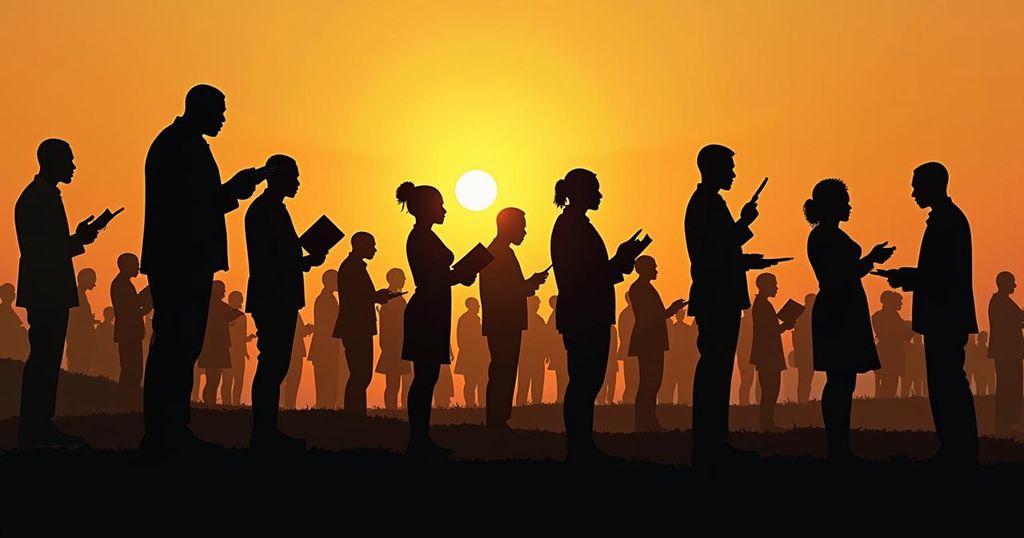Mozambicans Cast Their Ballots in Pivotal Presidential Election
Mozambicans are voting in a critical election, with the ruling Frelimo party expected to maintain its hold on power. President Filipe Nyusi, stepping down after two terms, voted early alongside presidential candidate Daniel Chapo. Chapo faces competitors from independent, opposition, and democratic movements as this election signifies a departure from Frelimo’s historical ties to the independence war. Major challenges, including economic opportunity and security issues, await the next president amidst a backdrop of high poverty rates.
Mozambicans are participating in a pivotal general election to elect a new president, with the ruling Frelimo party, established for over fifty years, anticipated to maintain its influence. President Filipe Nyusi, who has reached the end of his two-term limit, was among the first voters on the morning of the election, which commenced at 07:00 local time (05:00 GMT). The Frelimo candidate, Daniel Chapo, at 47 years old, was previously an obscure figure but has positioned himself as a proponent of change in the political landscape. Chapo’s opponents include independent candidate Venâncio Mondlane, Ossufo Momade, a former rebel commander and current leader of the principal opposition party Renamo, and Lutero Simango from the Mozambique Democratic Movement (MDM). This election is being perceived as a landmark event for Mozambique, as it marks the first time in history that the Frelimo party has nominated a candidate who did not partake in the country’s independence struggle, which culminated in independence from Portugal in 1975. Chapo, born in 1977, is often regarded as somewhat detached from the party’s history of corruption. Following a rain-soaked morning in the capital, Maputo, where many voters queued early to cast their ballots, President Nyusi implored voters to demonstrate patience throughout the electoral process. He stated, “I would also ask that no group of citizens agitates or threatens others, that everything happens in peace and tranquillity and that we avoid announcing the results ahead of time,” according to the AFP news agency. More than 16 million citizens are registered to vote in this election. Young voters such as 22-year-old Augusto Ndeve Pais expressed feelings of hope about the electoral process, highlighting concerns about the nation’s future. Analysts suggest that the forthcoming president will face significant challenges, with the primary concern being the creation of economic opportunities in a nation where 62% of the populace survives on less than $1.90 daily. Moreover, despite the promise of economic uplift from newly discovered gas reserves in the northern region, the situation has been exacerbated by an ongoing Islamist insurgency that began in 2017, which halted various liquefied natural gas initiatives. Despite military assistance from Rwandan and South African forces, these projects remain inactive. As the polls close at 18:00 local time, vote counting will commence, with preliminary results expected in about two weeks.
This general election is occurring at a critical time for Mozambique, a country still working to recover from a violent 16-year civil war that officially ended in 1992. Over the years, the Frelimo party has been the dominant political force since Mozambique gained independence in 1975. While the discovery of rich gas deposits has been anticipated to spur economic growth, persistent issues, including widespread poverty and an Islamist insurgency in the northern province of Cabo Delgado, have hindered significant development. The current political landscape is now witnessing a shift as the incoming leadership, represented by Daniel Chapo, navigates these challenges amidst calls for change from the electorate, particularly the youth who are eager for progress.
In summary, the Mozambican general election represents a significant moment for the nation’s political landscape. As citizens cast their votes, they hope for a transition toward greater economic opportunity and stability. The election not only marks a potential shift in leadership but also reflects broader societal demands for accountability and anti-corruption measures. The next president will have the vital task of addressing the pressing issues of poverty and economic development while managing the complexities presented by ongoing security threats in northern Mozambique.
Original Source: www.bbc.com




Post Comment